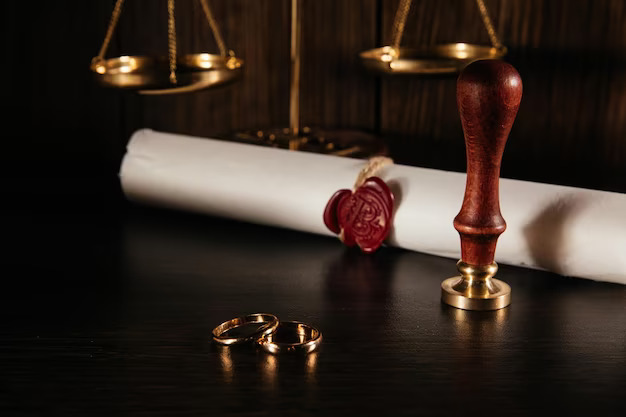What Is The Legal Procedure For Court Marriage ?
YourDoorStep is the most professional service provider of Court Marriage Service. What makes us different is the fact that we provide same day service and accept payment only after the work is done. This makes acquiring the Marriage certificate a hassle-free process.
Criteria for Court Marriage :
The criteria for Court Marriage is given below. Both the Boy and the Girl must meet all the requirements.
- Both the Boy and the Girl must be an Indian Citizen
- The Boy must be 21 years and girl must be 18 years in age or above
- Both Boy and Girl must not be married earlier
- Both must be physically and mentally sound and healthy
- They should not be related with the relations prohibited under law marriage before
How Y/our Lawyer helps in Court Marriage?
Our consultant will discuss the issue over a 24X7 helpline .
Step 1
Our consultant will discuss the issue over a 24X7 helpline .
Step 1
A detailed analysis of your case will be done by an experienced lawyer.
Step 2
You will be able to track your case with a personal account
Step 3
Court marriage rules and procedure in India 2023
Court marriage is a legal process that enables two individuals to solemnize their marriage in a court of law. It is a formal procedure recognized by the laws of India and allows couples to marry irrespective of their religion or caste. The right to marry the person of one’s choice is protected under Article 21 of the Indian Constitution.
There are various laws in India that govern court marriages and marriage registration. These include the Special Marriage Act, Hindu Marriage Act, Anand Marriage Act, Indian Christian Marriage & Divorce Act, among others. These laws provide the legal framework and requirements for conducting court marriages and registering them.
Unlike traditional marriages, which involve various rituals and ceremonies, court marriages are conducted in a court of law. The marriage ceremony takes place in the presence of a marriage registrar and witnesses. It is a simpler and more streamlined process aimed at legally formalizing the union of the couple.
Court marriages offer an alternative to couples who prefer a straightforward and legally recognized way of getting married, without the involvement of elaborate rituals or customs. It provides a means for individuals to exercise their right to marry and ensures the legal validity and recognition of their marriage under Indian law.

Eligibility criteria for your court marriage
To proceed with a court marriage in India, there are specific eligibility criteria that need to be fulfilled. These conditions ensure that the marriage is legally valid and recognized. The following criteria must be met:
Age Criteria: The minimum age requirement for both partners is determined by Indian laws. The male partner must be at least 21 years old, while the female partner must be at least 18 years old.
Mutual Consent: Both partners should willingly and mutually agree to marry each other. The decision to get married should be made without any force, coercion, or undue influence.
Non-Prohibited Relationships: Certain relationships are prohibited in different religions and customs. Before proceeding with a court marriage, it is important to ensure that the relationship between the partners is not prohibited by the applicable laws or religious practices.
No Active Relationships: In India, bigamy (being married to more than one person at the same time) is not allowed. Therefore, both partners should not have any active prior marriages or relationships. If either partner was previously married, they must provide a divorce decree from the court or proof of the spouse’s death through a death certificate.
By meeting these eligibility criteria, couples can proceed with their court marriage, ensuring that they comply with the legal requirements and have a valid marriage under Indian law.
Important documents required for court marriage
There are certain documents are needed for the court marriage of both partners & witnesses. List of documents both the partners & witnesses required for court marriage:
Documents For Male & Female Partners –
Identity Proof / ID Proof:
PAN Card / Driving License / Passport (Any one of them)
Address Proof:
Aadhar Card / Rent Agreement / Voter ID Card / Gas Bill / Electricity Bill (Any one of them)
Birth Proof:
Class 10 Marksheet or, Birth-Certificate (जन्म प्रमाण पत्र)
Divorce Decree:
In the case of a previous relationship, if the previous partners have taken divorce, they have to submit the divorce decree for marriage.
Death Certificate:
This is applicable only for the partners in a previous relationship such that one of the partners died. The living partner must have to submit the death certificate of the non-living spouse.
Photos:
6-6 passport size photos of male & female partners
Documents For Witnesses –
Identity Proof (ID Proof):
PAN Card / Driving License / Passport (Any one of them)
Address Proof:
Aadhar Card / Rent Agreement / Voter ID Card / Gas Bill / Electricity Bill (Any one of them)
Photos:
2-2 photos of all the witnesses
Important Laws for court marriage & marriage registration
- Special Marriage Act, 1954: The Special Marriage Act, 1954 is an important law for court. The process under this act usually takes around 30 days to complete. It is specifically designed for inter-religion marriages. Approval from the parents or guardians is necessary for marriages conducted under the Special Marriage Act.
marriages and marriage registrations, allowing individuals of different castes and religions to marry each other. It does not involve traditional marriage ceremonies or rituals. - Hindu Marriage Act, 1955: The Hindu Marriage Act, 1955 is applicable to Hindus, including Sikhs, Jains, and Buddhists. Under this act, the registration of marriages can be completed in a relatively short time, typically within 3-4 hours. Both partners must belong to the Hindu religion, but their specific castes are not relevant.
The process begins with the marriage ceremony conducted at an Arya Samaj Temple. The marriage is performed following Hindu Vedic rituals, including important customs like Saptapadi (seven pheras around the fire), Mangal Sutra, and Sindoor-Daan. Two witnesses are required for the Arya Samaj Marriage, and the entire process takes about 2-3 hours. After the Arya Samaj Marriage, the marriage is registered in a court under the Hindu Marriage Act, 1955, and a marriage certificate is issued.
- Marriage of Muslim Partners: For couples belonging to the Muslim religion, their marriages are registered under Muslim Personal Laws.
The process involves performing the Nikah ceremony, during which both the male and female partners sign a Nikah-Nama (marriage contract) in the presence of a Kazi (Muslim marriage officiant). The marriage is then registered in court, and the couple receives the marriage certificate after a few days.
- The Indian Christian Marriage Act, 1872: The Indian Christian Marriage Act, 1872 is applicable to Christians in India. If both partners belong to the Christian religion, their marriages are registered under this act.
The marriage ceremony is conducted in a church in the presence of a priest and two witnesses. After the church marriage, the marriage is registered in court according to the provisions of the Indian Christian Marriage Act, 1872.
- Parsi Marriage and Divorce Act, 1936: The Parsi Marriage and Divorce Act, 1936 applies to individuals belonging to the Parsi religion in India. If both partners are Parsis, their marriages are registered under this act.
The marriage ceremony takes place according to Parsi customs in the presence of a priest and two witnesses. After the ceremony, the marriage is registered in court as per the provisions of the Parsi Marriage and Divorce Act, 1936.
Complete process for court marriage
Step 1: Consult a Matrimonial Lawyer To ensure a smooth and hassle-free court marriage, it is advisable to consult a matrimonial lawyer. They will assist you with the necessary paperwork, organize your documents, and guide you through the entire process of court marriage. They can also help you register your marriage at the marriage registrar’s office.
Step 2: Notify the Marriage Registrar You need to submit a marriage application to the marriage officer of the district where at least one of the partners has been residing for a minimum of 30 days. This application should be submitted 30 days prior to your intended court marriage date. Both partners must sign the marriage application.
With the assistance of a lawyer, you can complete the marriage application accurately and ensure its submission to the marriage registrar’s office. The lawyer will help you with the necessary paperwork and streamline the court marriage process.
Step 3: Displaying the Notice of Intended Marriage The marriage officer will display the notice of your intended marriage for a duration of 30 days. As per Section 6 of the Special Marriage Act, 1954, the marriage officer is required to display the notice at a prominent location within the marriage office. Additionally, the marriage registrar maintains a record of all marriage applications in the “Marriage Notice Book.”
Step 4: Objection to the Marriage According to Section 7 of the Special Marriage Act, 1954, if anyone objects to the intended marriage, they can directly contact the marriage officer and raise their objection. The marriage officer has the authority to investigate the objection and halt the marriage process if necessary.
In the absence of any objections, the court marriage will proceed, and the marriage ceremony will take place in the presence of the marriage registrar.
Step 5: Completion of Court Marriage Court marriage differs from traditional marriages as there are no customs or rituals involved. During the court marriage, both partners are required to sign the declaration form of marriage in the presence of the marriage registrar and three witnesses. This formalizes the marriage of both partners.
Having a lawyer by your side throughout the court marriage process can help ensure that all necessary steps are followed correctly and that the marriage is legally recognized.
